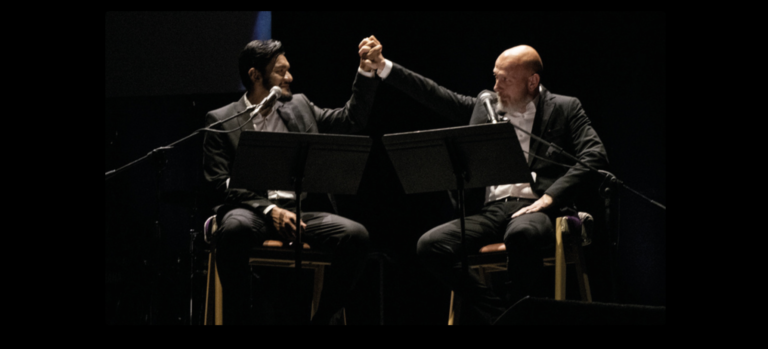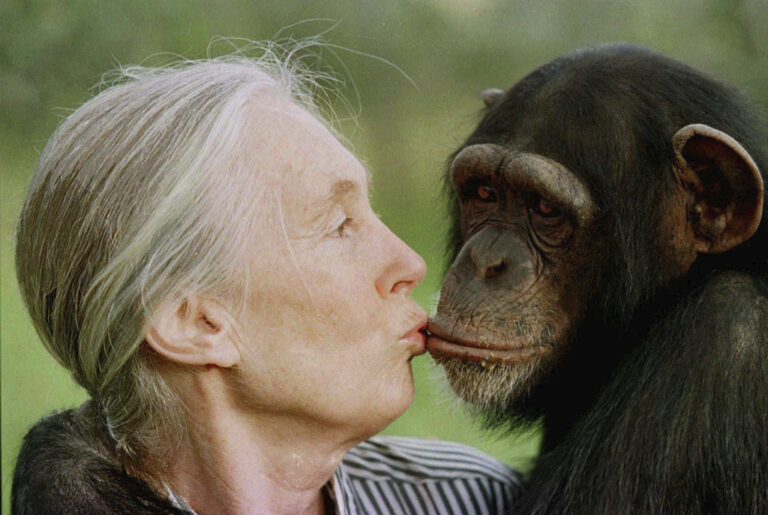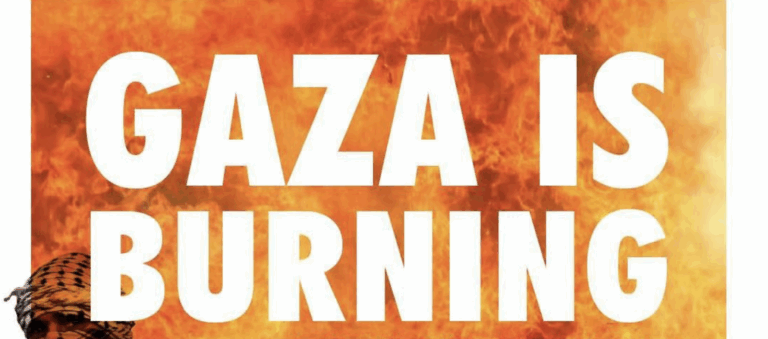By Andrea Tucci,
Inspired by the cult book by the writer Column McCann «Apeirogon» from the Greek grave mourning, the recital At the theater in Milan “Salām/Shalom” the shared tragedy of two “enemy” fathers rekindles the dialogue between Israelis and Palestinians
How many faces does pain have? And how many the conflict in the Middle East? Many must have asked themselves this in recent weeks, faced with the spread of violence like a crazy electrical discharge throughout the region, Gaza, of course, but also the West Bank and Lebanon. And then Syria and Iraq. Iran and Kurdistan. Pakistan. And Yemen, surrounding seas, straits and channels. Where is the meaning of everything that is happening? Where is the why, and where is the way out? Even geopolitics is floundering in front of the spillage of this horror. What if more adequate answers came from art? War has infinite faces, pain is infinite, just as the faces of the Apeirogon are infinite, the “unthinkable” polygon that gives its title to a book-phenomenon by the Irish-American writer Colum McCann. From that revelation work on war and peace, two Italian actors, Alessandro Lussiana and Massimo Somaglino, have drawn a recital that seems tailor-made to challenge the spiral of violence that began on 7 October: Salām/Shalom. Two fathers. Rami, an Israeli, and Bassam, a Palestinian, suffered the same tragic fate: they lost a very young daughter at the hands of the “enemy”. True story, the one on which Apeirogon is built and the recital cascades. The first had his 13-year-old daughter taken away in a suicide attack in Jerusalem in 1997; the second lost the 18-year-old girl exactly ten years later – hit by a plastic bullet fired by an Israeli border guard, who died in hospital after the ambulance that rescued her was stuck for hours at a checkpoint. Their absolute pain immediately turns into hatred, a thirst for revenge. Then, over time, once the two get to know each other, it becomes something else. Compassion, in the original sense of the term: your pain is the same as I feel. We can’t go on like this, it’s the natural consequence. We need another path. An emotional journey that only those who experience those wounds can undertake, but which everyone else can accompany and understand. To encourage. Precisely the response that seems to be coming from the public in these hours.
The desire for dialogue
After its debut last spring in Udine, as part of the Vicino/Lontano Festival, and at the Teatro Stabile, in Friuli Venezia Giulia, it arrives in Milan, encouraged by the Human Rights Foundation. The success of the initiative surprised the organizers themselves: seats sold out (the recital will be staged at the Radio Popolare Auditorium) even before launching the actual communication machine, after just a couple of posts on social media. “A small but significant sign” of the climate surrounding the war more than three months after the massacres of 7 October, reflects Danilo De Biasio, director of the Human Rights Foundation. «It gives the idea, it seems to me, that there is an increasingly widespread tiredness in seeing war as the only solution for any form of conflict». Whether out of compassion, or out of selfishness, the need for another path makes its way into public opinion. As photographed by the recent survey conducted by Swg for the Italian television channel La 7: half of Italians, but almost 70% of those who express their opinion on the issue, want the conflict to be resolved as soon as possible with the establishment of a State Palestinian led by moderate forces capable of living in peace alongside the Israeli one. With all due respect to the ultras who preach hatred and destruction. For De Biasio, the public’s interest in Salām/Shalom could also be the indicator of another need, psychological and almost physical: «The form of theater could be more interesting than the abuse of harrowing images of war in the media or on social media. “I want to deal with it, but not by looking at yet another image of a crying child or a kidnapped hostage,” seems to be the message.” Two bodies, those of the actors on stage, and their words that flow and intertwine are perhaps the best tool for being there, sharing, doing your part.
The power of the path of two fathers
On the other hand, those who are impressed by the power of the story of those two fathers, by the strength of their inner journey, are the actors themselves who have chosen to give them voice. «The effort of these two fathers to be able to transform the first feeling of revenge, violence, restitution of the pain caused into peace is absolute», Massimo Somaglino, one of the two creators and interpreters of the performance, tells Open. He recalls: “He hopes that with the recital he will be able to spread the emotion and also the “responsibility” of the incredible journey of those two fathers among the public. Cultivating trust. Because, he says, if on TV and in the newspapers «there is always and only war narration, the desire of the people is a desire for peace. But the pain must first be understood, then processed: then it can be transformed into a path to peace. A path that was impossible to reverse at that point.”




